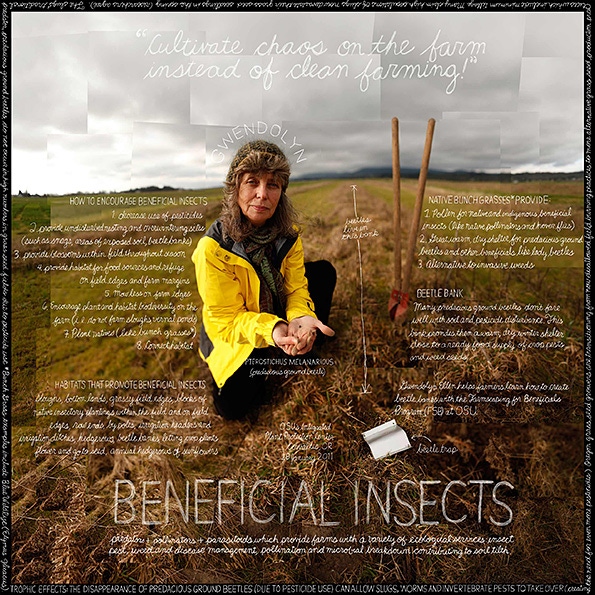Watchword: Beneficial Bugs
To draw attention to the best and brightest ideas in sustainability, the Lexicon of Sustainability's Food List project defines the words that are integral to a healthy, transparent, and accountable food system. Each week, we explore a new word through artwork, films, recipes, and written works.See all Food List words here.
April 22, 2015

Beneficial bugs: On a sustainable farm, the word “beneficials” refers to all the things that promote the long term viability of that farm. It is most often used to indicate organisms, such as insects, that either eat pests or fill niches that pests might otherwise occupy.
What is beneficial is highly dependent on the type of farm and the ecosystem the farm is located in. There may even be cases where a particular insect is beneficial for one type of farm and detrimental for another, just because of the different ecosystems.
Almost all crops have pests, but a sustainable farm will first encourage and utilize beneficial organisms that are already present in that ecosystem before turning to other control measures. Encouraging beneficial organisms may involve planting cover crops that provide refuge for beneficial insects, making sure spray types and timings don’t reduce the beneficial insect mortality, or mixing crop types so that more beneficial insect species can thrive.
In many cases, these beneficials might refer to the ladybugs, lacewings, and other insects that control aphids and mites. It might also refer to viruses used to debilitate pest insects or even the spiders, earwigs, nematodes, and other species present that help to keep the orchard system in balance. The use of beneficials is a way a sustainable farmer can use controls that are already present in the farm ecosystem, and allow that system to operate without needing to introduce outside inputs that might disrupt other critical parts of the farm system.

Title: Beneficial Insects
Location: OSU’s Integrated Plant Protection Center, Corvallis, OR
Featuring: Gwendolyn Ellen
Beneficial insects are predators, parasites, and parasitoids which provide farms with a variety of ecological services, including insect, pest, weed, and disease management, and pollination and microbial breakdown contributing to soil tilth.
Many predaceous ground beetles don’t fare well with soil and pesticide disturbance. Gwendolyn Ellen helps farmers learn how to create beetle banks with the Farmscaping for Beneficials Program (FSB) at OSU. Beetle Banks provide the insects with a warm, dry winter shelter close to a ready food supply of crop pests and weed seeds.
Gwendolyn explains that beneficial insects can be encouraged through the decreased use of pesticides; providing undisturbed nesting and overwintering sites (such as beetle banks); providing blossom within the field throughout the season and habitats for food sources and refuge; and by mowing less farm edges and encouraging plant and habitat biodiversity. The disappearance of predaceous ground beetles occurs due to the use of pesticides. Their disappearance can allow for slugs, works, and invertebrate pests to take over, creating the need for even more pesticides. Oregon grass seed growers are transitioning from now disallowed field burning practices to more alternative grass seed production practices which include minimum tillage.
Short film: "Insectary Plants for Your Garden" by Cooking Up a Story
Gardens are beautiful feasting grounds for many insects, both desirable and undesirable. In the video above, master gardener Jen Aron shares her knowledge of insectary plants that attract beneficial insects. She points out that many of our favorite vegetable plants, like broccoli, also bloom into wonderful attractive flowers for pollinators and predaceous insects. Insects are constantly in search of nectar and habitat, two things we can provide in our gardens by thoughtfully selecting plants to allure beneficials. Do this and you’ll find butterflies flirting in your flowers, bumblebees eagerly collecting pollen, and ladybugs patrolling your grounds for delicious intruders.
Three things you can do
The right mix of insects is vital to maintaining a healthy farm and garden. From pollination to pest control, these creepy crawlers are a secret ingredient to farmers’ success.
Design your garden to welcome beneficials. Help beneficials help you. With thoughtful consideration, you can provide shelter and food for these garden helpers.
Flower bomb! Bee friendly, flirt with the butterflies, and support local beautification.
Buy organic. Organic farming helps build and maintain healthy soils, avoids the use of harmful pesticides, and promotes biodiversity — thus supporting healthy ecosystems for beneficial insects to thrive within.

What methods do you use to attract beneficial insects to your garden?
For the past three years, the Lexicon of Sustainability has sought out the foremost practitioners of sustainability in food and farming to gain their insights and experiences on this important subject. What began as a photography project to spread their knowledge has grown to include short films, study guides, traveling shows, a book, and a website where people can add their own terms to this ever-evolving lexicon. See more at www.lexiconofsustainability.com.
About the Author(s)
You May Also Like





